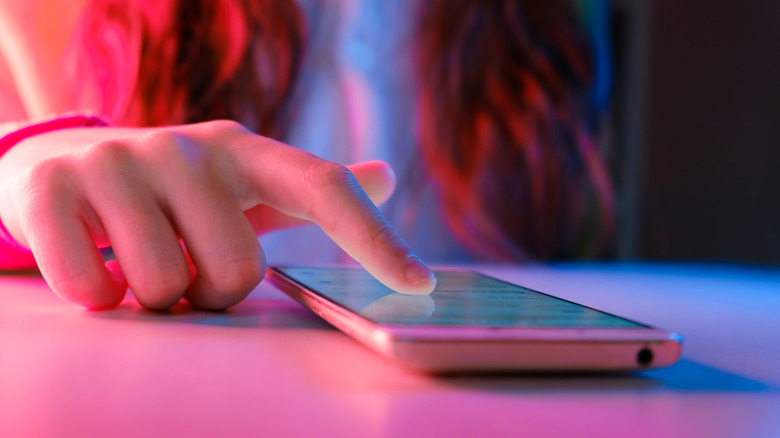Why Doomscrolling Is Bad For You, According To Science
It can be intoxicating staying up past midnight scrolling through stories about missile bombardment in Ukraine, kidnappings, serial murders, or rescues of animals in peril. Many of us do it, but few realize that scientists have given this phenomenon a name: "doomscrolling." Strange as it may seem, our love of disaster as entertainment has become so prevalent in our tech-saturated age that a term needed to be coined. And although it's still not incorporated into many dictionaries, Merriam-Webster is keeping an eye on it. The word is pending on their watch list and is defined as (via Reader's Digest) "the tendency to continue to surf or scroll through bad news, even though that news is saddening, disheartening, or depressing."
As a recent study in Health Communication suggests, psychologists believe doomscrolling can also adversely impact our mental health. The term joined the American lexicon in 2020 — the year that saw a pandemic, lockdowns, and a sharp rise in political turmoil. On top of it all, people spent more time with their devices. Since the effects of negative media on mental health isn't a new topic, researchers have looked toward past research to illuminate the modern crisis, but psychologists note that the new wave of negative media, plus our technology and unique politics, make doomscrolling a different kind of stress, per Inside Science.
Previous research on negative media
The National Academy of Sciences published a study in 2014 that compared stress caused by exposure to the Boston Marathon bombings vs the media coverage of the event. They found that media coverage worsened collective stress. A study in Psychological Science (posted at Sage Journals) showed that images of war for four hours a day worsened acute stress symptoms up to three years following the 9/11 attacks on the World Trade Center. Judith Anderson, who collaborated on the study, said (via Inside Science), "You didn't have to live near the epicenter of the attacks, you could just as easily be in rural Alabama."
The studies don't suggest that we shield ourselves from world events, but rather that we need to self-regulate our consumption of news and social media. Although the above studies came about after the internet, media such as television and movies have been on the radar of those who wonder if news and entertainment can be damaging. We're reminded by the ACLU that in America's past, worry over the effects of violence in the media has led to censorship. Today, there's another layer to this problem with semi-true and sometimes completely untrue media saturating our feeds. To combat any negative effects, the answer may be more information to promote mindfulness of the problem. According to The Guardian, some people are not as affected by negative news, while others fall into an obsessive pattern. It's the compulsive tendency to consume negative news that becomes a problem for many.
Will doomscrolling be a problem in post-COVID America?
In August of this year, a new study showed that in the age of the COVID-19 pandemic, an obsession with news reports caused additional stress and anxiety for many individuals. As with previous studies, the compulsive side of news checking was deemed the main problem, not consuming information to stay abreast of current issues. The study said we should "focus more on identifying ways to develop a healthier relationship with the news," per Health Communication.
Bryan McLaughlin, who authored the study, advances several aspects of problematic media consumption: transportation, preoccupation, misregulation, underregulation, and interference. The first refers to total absorption in the narrative, the second the preoccupation with the news story after one has left it, and misregulation and underregulation refer to a failure to moderate consumption or the inability to do so. Finally, interference is when the news obsession hurts our social relationships and other day-to-day activities. This frames maladaptive media consumption as a kind of addiction, though the study recognizes the controversies surrounding that implication (via Health Communication). Although the pandemic has waned, people still work and go to school remotely, increasing the time spent online. We can only speculate about what this means for the future and if we'll be better able to regulate the information we consume in our digital worlds.


